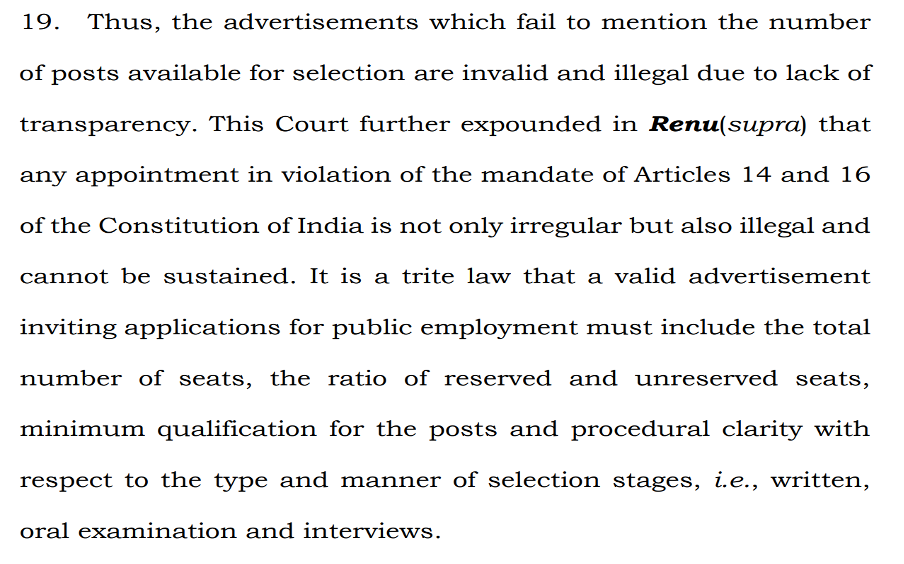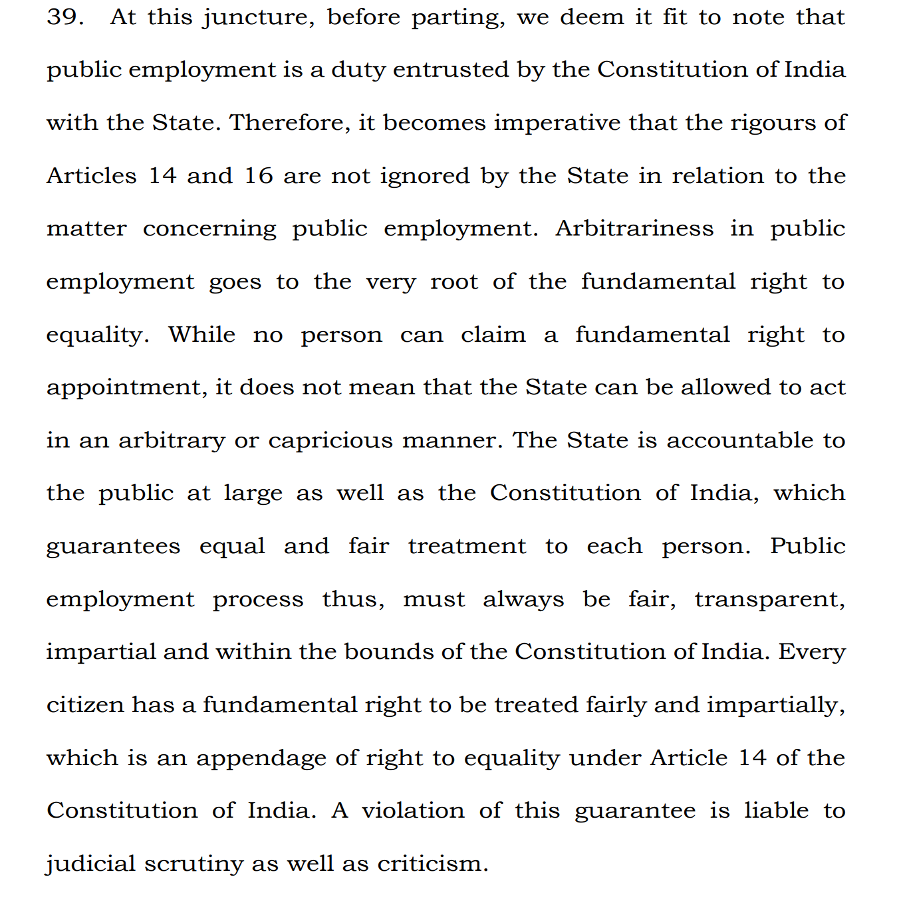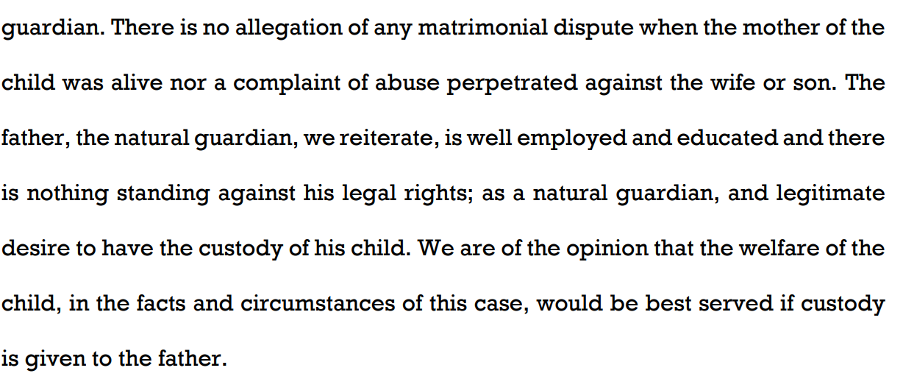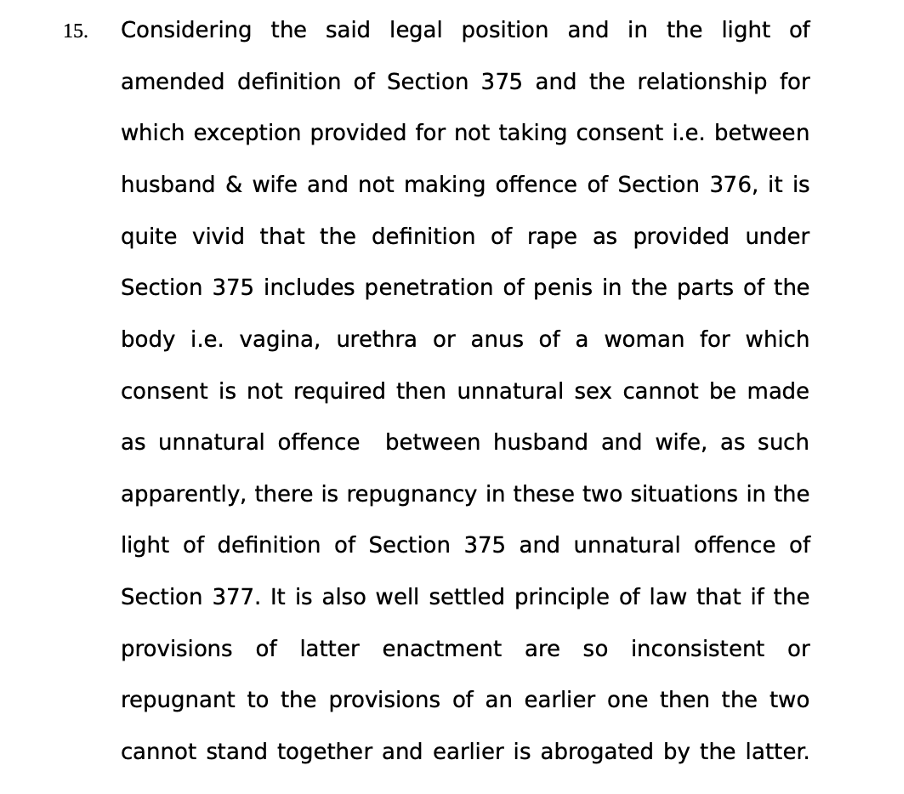In this edition of the Court Judgements review, we look at the Supreme Court’s judgement on Child’s custody, the validity of appointments with void advertisements, Kerala High Court’s judgement on adoptive parents meeting child physically, Chhattisgarh High Court’s judgement on unnatural sex of husband with wife, and Jharkhand High Court’s judgement on excluding psychiatric treatment from medical reimbursement schemes.
Supreme Court: Once the appointment process is declared to be a nullity in law, every action taken in furtherance of such appointment process is also illegal.
The Supreme Court, in Amrit Yadav vs. The State of Jharkhand & Ors., ruled that if an appointment process is declared legally void, all actions based on it are also illegal. As a result, constitutional courts have the authority to annul such appointments from the outset. The Court emphasized that public employment is a constitutional duty of the State and must always be fair, transparent, and impartial.
A two-judge bench, comprising Justices Pankaj Mithal and Sandeep Mehta, was hearing an appeal against Jharkhand High Court rulings. The case involved recruitment for Class IV posts by the Deputy Commissioner, Palamu. After the selection process concluded and appointment letters were issued, allegations of corruption and large-scale cheating led to an FIR. Non-selected candidates challenged the process in the High Court, arguing that only examination marks should be considered, as the advertisement did not mention an interview. A single-judge bench ruled in their favour. On appeal, the division bench upheld this decision and terminated the selected candidates’ appointments. When this termination was further contested, the High Court dismissed the challenge, stating that introducing an interview mid-process violated fairness principles.
The appellant argued that he had been duly appointed, served for over two years, and was now ineligible for other government jobs due to age. However, the State contended that an unlawful appointment does not grant the right to continue in service, especially over more meritorious candidates.
Referring to Renu vs. District and Sessions Judge, Tis Hazari Courts, Delhi, the Supreme Court held that recruitment advertisements lacking transparency—such as failing to specify the number of vacancies—are invalid.

Further, relying on M.P. State Coop. Bank Ltd. vs. Nanuram Yadav, the court held that once the appointment process is declared to be a nullity in law, every action taken in furtherance of such appointment process is also illegal. It also held that Arbitrariness in public employment goes to the very root of the fundamental right to equality, and the public employment process thus must always be fair, transparent, impartial and within the bounds of the Constitution of India.

Accordingly, the appeals were dismissed.
Supreme Court: Upholds Father’s Rights over Grandparents in child custody case
The Supreme Court, in Vivek Kumar Chaturvedi & Anr. vs. State of U.P & Ors. ruled in favour of a father seeking custody of his minor son from the child’s maternal grandparents, following the mother’s passing. The father had challenged the decision of the Writ Court, which denied him custody and instead allowed the child to remain with his grandparents while granting the father visitation rights.
The Writ Court, presided over by a Single Judge, had interacted with the child, who expressed comfort in residing with his maternal grandfather and continuing his education there. The court also noted that the father had remarried, which influenced the decision to maintain the child’s current living arrangement. The father was granted visitation rights on the first day of every month at a venue designated by the local police station.
The appellant relied on Gautam Kumar Das vs. NCT of Delhi, arguing that the natural guardian, especially in the absence of the mother, has a primary right to custody. He contended that the child had been separated from him since 2021, leading to unfamiliarity. Additionally, he highlighted financial provisions made for the child’s welfare, including property conveyance by the paternal grandfather and a deposit of ₹10 lakh in the child’s name. The father, a State Administrative Service Officer, also submitted an affidavit from his second wife, assuring her commitment to raising the child as her own.
The respondents relied on Nirmala vs. Kulwant Singh & Ors., arguing that child custody matters require a detailed inquiry under the Guardian and Wards Act, 1890. Since the father had already initiated a custody petition under the Act, they contended that a Habeas Corpus petition was not maintainable. The High Court had previously considered the father’s remarriage as a factor in denying custody.
The Supreme Court analysed relevant precedents, including Tejaswini Gaud & Ors. vs. Shekhar Jagdish Prasad Tewari & Ors., which held that a Habeas Corpus petition is generally maintainable in child custody cases only when the child’s detention is unlawful. However, in cases where custody is sought by the natural guardian from third parties without legal guardianship rights, such petitions may be entertained. The Court found that Gautam Kumar Das had followed a similar reasoning, emphasizing that each case must be assessed based on its unique facts.
In this case, the Court observed that the grandparents, with assistance from the child’s maternal relatives, had been taking care of him. However, they had also initiated a maintenance claim for ₹20,000 per month, indicating financial constraints. On the other hand, the father, an educated and well-employed individual, had made substantial financial arrangements for the child’s future. The Court noted that there were no allegations of mistreatment or neglect against the father.
The Court found that the Writ Court had failed to assess the child’s attitude towards his father adequately. Given that the child had lived with both parents for the first ten years of his life and there was no history of matrimonial disputes, the Supreme Court held that the father, as the natural guardian, had a rightful claim to custody.

Recognizing the child’s current stability with his grandparents, the Court allowed the child to complete the academic year before transitioning to his father’s custody. Until then, the father was granted alternate weekend visitation rights. Post-transfer, the grandparents were permitted monthly visits for a year, after which the child’s preference would be considered.
Accordingly, the appeal was disposed of.
Kerala High Court: Prospective adoptive parents can be expected to express their preference only after reviewing the reports, especially when they are not permitted to see the child physically.
In the present case, Lijo Stephen Chacko vs. Union of India, the petitioner and his wife, proud parents of a five-year-old adopted son, sought to adopt a daughter. Accordingly, on 02 February 2021, they registered on the Child Adoption Resource Information and Guidance System (CARINGS), the designated portal of the Central Adoption Resource Agency (CARA). The petitioner received referrals for two children from Maharashtra and Karnataka. Being a resident of Kerala, the petitioner believed that adopting a child from the same state would simplify the process and, therefore, deferred acceptance. On 11 November 2024, at 10:00 p.m., the petitioner received an email (Ext.P1) referring a third child’s profile, instructing him to reserve the child within 48 hours. However, the child’s medical examination report was not accessible on CARINGS. The petitioner promptly requested this document via email (Ext.P2) to the Specialised Adoption Agency, which provided it on 12 November 2024 at 5:58 p.m. (Ext.P3). After reviewing the report, the petitioner intended to proceed with the adoption, but before he could complete the reservation, the child’s profile was removed on 14 November 2024 at 9:36 a.m. (Ext.P4). Subsequently, CARA informed the petitioner that, having failed to reserve three referred children, he and his wife were debarred from adoption for one year under Regulation 9(3) of the Adoption Regulations, 2022.

The petitioner contends that the 48-hour period should have been calculated from the time he received the medical report, as required under Regulation 11(17).

The failure of the respondents to consider this resulted in an unjust debarring. Further, the order was issued without proper consideration of the petitioner’s representations (Exts.P5 to P10) and without affording him an opportunity to be heard, violating principles of natural justice. The counsel for the petitioner emphasized that his client had been waiting for four years to adopt and that the delay was solely due to the unavailability of the medical report on CARINGS. The respondents’ rigid adherence to procedural timelines disregarded the reality of the situation and unfairly penalized the petitioner.
Opposing the writ petition, the Deputy Solicitor General defended the respondents’ actions, arguing that they complied with the Regulations. He asserted that with over 32,000 prospective adoptive parents awaiting children, the petitioner could not be selective. Since the petitioner failed to reserve the profile within 48 hours, his disqualification was justified, and an appeal remedy under Regulation 62 was available.
Considering the submissions, the court looked at the relevant legal provisions. The Juvenile Justice (Care and Protection of Children) Act, 2015 (JJ Act) governs adoption in India, with Chapter VIII detailing the adoption process. Section 2(2) of the Act defines adoption, while Regulation 10 outlines the procedure for resident Indians. Regulation 11 mandates that both the child study report and medical examination report be provided before adoption. In this case, the petitioner registered on CARINGS on 02 February 2021 but could not reserve the third referral within the deadline due to the delayed medical report. The respondents removed the child’s profile before the 48-hour period could be counted from the receipt of the medical report, demonstrating a clear procedural lapse.
Section 59(6) of the JJ Act explicitly mandates that a child’s profile must be provided with both the child’s study and medical reports, ensuring prospective parents make informed decisions. The petitioner’s inability to access the medical report within the stipulated timeframe directly resulted in his inability to reserve the child, making the removal of the profile and subsequent debarment arbitrary.

The respondents’ failure to consider the petitioner’s explanation before issuing Ext.P11 violates the fundamental principles of natural justice. The Supreme Court, in Rosy Jacob vs. Jacob A Chakramakkal, held that children are not mere chattels but individuals requiring careful consideration in adoption decisions. Moreover, Regulation 63 empowers the Relaxation Committee of CARA to make exceptions in deserving cases, indicating that adoption regulations are not strictly mandatory but can be applied with discretion.

The Court remarked that adoption is not a mere legal transaction but a deeply emotional and social commitment. The Supreme Court, in Lakshmi Kant Pandey vs. Union of India, emphasized that adoption involves nurturing a child’s full physical, emotional, and intellectual potential for the nation’s well-being. Matters concerning children require a compassionate and humane approach rather than rigid adherence to procedural technicalities.
Accordingly, the orders of debarment were quashed, and the respondent was directed to refer one more child to the petitioner.
Jharkhand High Court: There cannot be any discrimination in respect of reimbursement of expenses made by a person suffering from physical illness and mental illness.
In Santosh Kumar Verma vs. Bharat Coking Coal Ltd and Others, and a significant ruling, the Jharkhand High Court held that a patient receiving psychiatric treatment has to get the same benefit similar to a person suffering from physical illness and there cannot be any discrimination in reimbursements of expenses made by a person suffering from physical and mental illness.
This writ petition challenges the rejection of the petitioner’s claim for reimbursement of his wife’s psychiatric treatment expenses. The petitioner seeks to quash the Office Note dated 26 October 2019 and the letter dated 23 January 2020, which denied his medical bill reimbursement on the grounds that psychiatric treatment is not covered under Clause 6.3(i) of the Contributory Post Retirement Medicare Scheme for Executives (CPRMS) of Coal India Limited (CIL) and its subsidiaries. The petitioner also sought a direction to the respondents to reimburse the amount deducted from his bills for his wife’s psychiatric treatment.
The petitioner’s counsel argued that the rejection of reimbursement is arbitrary and discriminatory. He emphasized that mental healthcare should not be treated differently from physical healthcare. As a retired executive of Bharat Coking Coal Limited (BCCL), a subsidiary of CIL, the petitioner is entitled to medical reimbursement under CPRMS. However, the respondents have denied this claim, citing Clause 6.3(i) of the scheme, which excludes psychiatric treatment. The petitioner contended that such a distinction is not based on any rational or intelligible differentia and is therefore illegal.
The Court noted that the facts of the case are undisputed. The petitioner, a retired BCCL executive, sought psychiatric treatment for his wife and submitted claims for reimbursement. The respondents deducted the psychiatric treatment expenses, relying on CPRMS rules.
The Court examined the provisions of CPRMS, which provide medical benefits to retired executives and their spouses. While Clause 3.2.1.d of the scheme allows unlimited reimbursement for serious illnesses such as cancer, heart disease, and renal disease, psychiatric treatment is excluded under Clause 6.3(i). The court then analysed the Mental Healthcare Act, 2017, which was enacted to ensure access to mental healthcare services and to eliminate discrimination against persons with mental illness. Section 18 of the Act guarantees the right to mental healthcare,

while Section 21(1)(e) mandates that persons with mental illness receive healthcare services on par with those suffering from physical illnesses.

Section 21(4) specifically requires insurers to provide medical insurance for mental illness on the same basis as physical illnesses.

The court held that the exclusion of psychiatric treatment expenses under CPRMS violates the Mental Healthcare Act, 2017, which has overriding statutory authority. Since CIL and its subsidiaries are considered “State” under Article 12 of the Constitution, they cannot formulate policies that contradict a parliamentary law. Consequently, Clause 6.3(i) of CPRMS, to the extent that it excludes psychiatric treatment, is rendered void.

In light of this, the court ruled that patients receiving psychiatric treatment must be granted the same benefits as those with physical illnesses. Accordingly, the Office Note dated 26 October 2019 and the letter dated 23 January 2020, which rejected the petitioner’s reimbursement claim, were set aside. The respondents are directed to reimburse the petitioner’s expenses for his wife’s psychiatric treatment.
Chhattisgarh High Court: Unnatural sex as defined under section 377 committed by the husband with his wife, cannot be treated to be an offence.
In Gorakhnth Sharma vs. State of Chhattisgarh, the Chhattisgarh High Court acquitted a person accused of committing unnatural sex with his wife, stating that amendment in Section 375 IPC in the year 2013, an exception has been provided which says that sexual intercourse or sexual acts by a man with his wife is not a rape and therefore if any unnatural sex as defined under section 377 is committed by the husband with his wife, then it can also not be treated to be an offence.
The appellant was convicted under Sections 377, 376, and 304 of the IPC for allegedly engaging in unnatural sexual acts with his wife, leading to severe injuries and her death. The trial court sentenced him to 10 years of rigorous imprisonment for each offence, to run concurrently. Challenging the conviction, the appellant argued that the case relied on an unreliable and uncorroborated dying declaration, while key witnesses had turned hostile. He also claimed that the medical evidence suggested the victim had piles, which could explain her injuries, and that the charges under Sections 376 and 377 IPC were misapplied due to the legal exemption for marital relations. The prosecution countered that the dying declaration, along with medical evidence confirming rectal perforations and peritonitis as the cause of death, proved the appellant’s guilt beyond a reasonable doubt.
The High Court reviewed legal provisions and precedents, including Navtej Singh Johar vs. Union of India (2018), which decriminalized consensual same-sex relations but did not remove the marital exemption under Exception-2 to Section 375 IPC.

Since the victim was the appellant’s wife and was over 15 years old, the court held that the charges of rape and unnatural offences were not applicable.

The court also found the dying declaration unreliable, as it lacked clarity and was recorded without confirmation of a doctor’s presence. Regarding the Section 304 IPC charge, the court ruled that there was no evidence to prove the appellant’s actions directly caused the victim’s death or that he had the intent or knowledge required for culpable homicide. Concluding that the prosecution failed to establish guilt beyond a reasonable doubt, the High Court set aside the convictions and acquitted the appellant of all charges.



